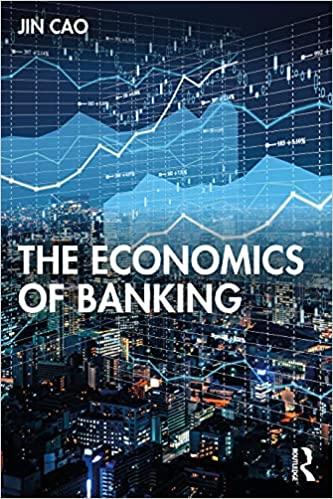Exploring the data resources listed in Exercise 1, Chapter 1, depending on data availability, try to answer
Question:
Exploring the data resources listed in Exercise 1, Chapter 1, depending on data availability, try to answer the following questions regarding bank competition in your country/region:
(a) Plot the time trends in the measurements of bank competition, such as CRn, HHI, H-statistic, Lerner Index, etc., for your country/region.
i. What are the general trends in bank competition in your country/region?
ii. What may explain the trends?
iii. Can you design empirical tests on your hypotheses?
(b) Entry and exit:
i. Are there major mergers and acquisitions (M\&As) in your sample period?
ii. Are there any new major entrants, especially those from the multinational global banks? Are there any major exits?
iii. Are there any regulation or deregulation on entry or branching restrictions, both on the national level and regional level?
iv. What are the consequences on bank competition after these episodes?
Exercise 1, Chapter 1:
There is a growing list of publicly available online resources for consolidated banking statistics and macroeconomic data, including:
- BIS statistics, Bank for International Settlements, available at https://www.bis.org/statistics/index.htm;
- European Central Bank Statistical Data Warehouse, available at https://sdw.ecb.europa.eu/;
- Eurostat, available at https://ec.europa.eu/eurostat/;
- FDIC Historical Bank Data, available at https://banks.data.fdic. gov/explore/historical;
- FRED (Federal Reserve Economic Data) from Federal Reserve Bank of St. Louis, available at https://fred.stlouisfed.org/;
- IMF data, International Monetary Fund, available at https:// www.imf.org/en/Data;
- World Bank Global Financial Development Database, available at https://www.worldbank.org/en/publication/gfdr/data/ global-financial-development-database.
You also have a considerably good chance to find comprehensive banking and macroeconomic data from your national/regional authorities, such as:
- Central banks or monetary authorities, especially their monetary policy reports and financial stability reports;
- Bureaus of statistics;
- Banking regulators, such as financial supervisory authorities.
Archives of financial newspapers are often good resources for historical data, too.
Exploring the data sources listed above, try to understand the banking sector in your country/region through-depending on data availability-the following indicators:
(a) Size: total bank assets relative to GDP. How is the size of the banking sector evolving over time?
(b) Types of banks:
i. How many types of banks are defined by law? How many banks are there in each category? What is the share of each category in total bank assets?
ii. How many foreign-owned banks are there? What is the share of foreign banks in total bank assets? Among them, how many are foreign subsidiaries and how many are foreign branches?
(c) How important is bank funding, versus market funding? Would you categorize the economy as "market-oriented" or "bank-oriented"?
(d) Bank performance:
i. How is banks' average return on assets (ROA) evolving over time? How about banks' average return on equity (ROE)?
ii. How is banks' average net interest margin (NIM) evolving over time?
iii. Do banks rely more on interest income or non-interest income? How is the dependence evolving over time?
(e) What is the share of retail deposits in banks' total liabilities? What is the share of wholesale funding?
(f) Were there any banking crises, or influential episodes of failed banks in history? What were the causes and major consequences?
Step by Step Answer:






